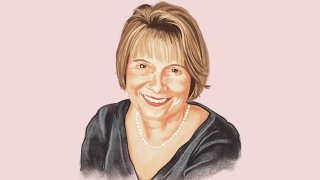You helped create USC Rossier’s new MAT Teacher Preparation Residency program. Tell me more about your role.
Karen Gallagher, our former dean, knew Karen DeMoss, who had launched the Bank Street College of Education program Prepared to Teach, and she said, “Why don’t we look into it?” I got in touch with Karen DeMoss, and we ended up doing our first residency through Prepared to Teach. The residency went well; we had a diverse group of residents teaching sixth through eighth grade at John Burroughs Middle School. When Dean Pedro Noguera came, I said to him, “you know, we just finished a residency program,” and he said, “Oh, yeah, tell me about that.” Six residents had finished the program on time with credentials, and they all got jobs, but because of COVID, the funds for the next residency were reallocated at the state level. Dean Pedro Noguera went to work on it. He found us funding, and we started working in partnership with LAUSD. We provide scholarships, and they provide living stipends. Our first six residents enrolled in fall 2021 and are due to graduate this spring.
The new program was created, in part, to help address the teacher shortage facing Los Angeles Unified and districts across the nation. What were some of the reasons why the first residency program was started?
When we started the first residency, the teacher shortage in Los Angeles wasn’t so much in full swing, except in STEM and education specialists. We wanted to widen the pool of people who could become teachers at USC. USC is expensive, and we wanted to be able to prepare a much broader group of students, mainly students who had grown up in the communities around USC, to become teachers. We were looking to have more males in elementary education and to have a wider group of people from different racial, cultural, religious and linguistic backgrounds. We wanted the residents to bring all that capital, all that knowledge, to the teaching profession, and then integrate it with what they learned in our program. These ideas were an important outreach of our USC Rossier mission into our community and continued to be important in this next residency.
Districts across the nation are facing a teacher shortage. Why are teachers leaving the profession early, and what prevents potential teachers from pursuing the profession?
The role of a teacher has shifted dramatically, and it continues to shift, especially through the pandemic. When I first started working full time at USC Rossier in 2004, we were focused on good, strong pedagogical instruction. We wanted our candidates going into the classroom knowing what to do instructionally, with confidence. However, we learned that you need to teach the whole child. Kids come into the classroom with needs, and the teacher is the person who has to address those needs. Some kids approach learning on a superhighway; some go on a bumpy road. Making relationships with kids to make either road, and all those in between, accessible is the foundation of everything we do.
We need to teach the content, put out good democratic citizens, and help kids heal from whatever they’ve experienced outside of school—and sometimes in school. Kids need more than the content in schools. They need support, friendship, and people to value them and give them a voice toward empowerment. And to do that for every kid—which we need to—can be challenging.
Before the residency, many students came to and graduated from the MAT with a great deal of debt, going into a job that starts at around $52,000. How can that be? For most teachers, it’s not all about the money. There are so many people in it for the right reasons. And if we don’t change the debt and support picture, we’re going to lose them.
How can we, as a society, help encourage teachers to enter and stay in the profession?
At USC, we have had difficulty recruiting teachers from our undergraduate population, but two of our residents this year are USC grads. The rate of teachers leaving the profession has stayed fairly consistent. Around 44% of teachers leave after their third year, but around 80% to 90% of teaching residents stay after their first three years. There are a couple of reasons: They don’t have as much student debt, and the graduates are ready to be in the classroom. We need to prepare teachers well. We need to pay them well and support them.
A team approach that really is a team approach is also important. If we had psychologists, nurses and counselors—who come more than just once a week or month—and a teacher was the manager of that team, that would make a big difference. Teachers are doing the most important job in the world. We say that to our students, but the rest of the world doesn’t say it.
What is the admissions committee looking for in applicants, and do you have any advice for those who are considering applying?
We’re looking for people who have knowledge of the communities we want them to go back and teach in. Our residents have a contract with LAUSD that they need to teach for four years afterward. And we want them to understand—from an asset model, not from a deficit model—all the potential that can come out of our communities. We’re looking for people who are underrepresented in the teaching profession—African American males, women in STEM, people who have STEM backgrounds and want to teach elementary school, people who are multilingual and education specialists. And, first and foremost, people who really want to be teachers and like kids.
Looking back on your time as an educator, what are your most proud of?
What makes me feel good every day is when students say to me, “I really loved your class. Your class really had content. I want to be in your class next term.” If I have been able to connect with a student in a way that’s going to help them go out and be a better teacher, that’s the most important thing to me. At USC Rossier, I’ve been the chair of the faculty council. I’ve been on the USC Rossier coordination team for Academic Program Reviews for the doctoral program and the MAT program, and with colleagues I’ve gotten us through three accreditations. I was one of the original writers of the MAT program when it went online. We were the only people doing it back then: We got it out in 2009; then we kind of redid it in 2012, and then we [revised] it again in 2015. With this last revision, we created a dual credential for education specialist and general ed teacher. That’s really important to me, because I’m originally a special ed teacher. All of those things are important, but they’re not as important as the connections with students and helping them have the confidence to go into classrooms.
What’s the most challenging job you’ve had in your career?
My first teaching job was one of my most challenging jobs. I did not have a lot of support, and I left at Christmastime. I became a statistic: I was a teacher dropout. I had taken a few long-term sub jobs after college and went on to become an AmeriCorps VISTA volunteer. I went for a year to eastern North Carolina, and then I came back to Boston where I’m from. I took a resource specialist position in Jamaica Plain. The school had never had an RSP before, and I was dealing with kids who needed more than RSP support. I had a parent come into my classroom and shove me up against the wall. I said, “That’s it. I don’t need this.” So, I left my job and moved to California. And then as quickly as possible, I got my teaching credentials again. I started teaching and worked for L.A. County for around 16 years.
Early in your career, you spent more than 10 years in the classroom as a special education teacher in Los Angeles. What initially drew you to that particular field?
My father was a first-generation Italian. He had gone to college, but he’s the only one in his family who did. No one in my mother’s family went to college. He wanted me to become a child psychiatrist. The confidence to do that kind of thing, it really wasn’t my brain temperament. So, he said, “What about a child psychologist?” and I said, “Let me start here.” And I became a special education teacher. Then I got my master’s in counseling psychology and then my doctorate at USC in curriculum, technology and special education. It worked out fine. I have no regrets. I married a psychiatrist.
What can schools of education do to help prepare future educators for the unique challenges of teaching?
We could support them financially and make sure that we have a culturally diverse population of teacher candidates. We’re starting a new initiative, with the Neighborhood Academic Initiative, and some of the MAT classes are going to be taught out at the schools. Pulling our partners into our role and jumping into theirs can only help. That’s how the things we do become relevant and become pertinent to what kids need to know. Some people think that schools of education are superfluous—they think candidates should go out into the schools and learn as apprentices. But there’s so much more to it. When we first put the MAT program together, we subscribed to a sociocultural approach. We acknowledged that academics and social learning were equally important. I hope we always remember that, because kids need the social learning now more than ever.
What advice do you have for teachers just entering the field?
Don’t enter it if you don’t love it. That’s No. 1. I think to be a teacher, you have to really be committed to being a teacher. And a lot of people say, “Oh, what’s so bad about them coming in for a couple of years?” Well, if they’re really committed, there’s nothing bad about it. But education is not a stepping-stone profession. These are real kids. I would tell them to keep an open mind. Make sure your parents are on the team and are an integral part of the kids’ education to the extent that they can be. It’s hard to bridge the gap between home and school and teacher preparation. My colleagues and I have spent our careers trying to improve that.
You are retiring at the end of this school year. What’s next for you?
I have some projects in mind. One of my former doctoral students, who’s now a principal in Oregon, and I keep talking about writing this book. We have about six chapters, so maybe we’ll be able to finish it. I have some other writing projects I want to do. I want to volunteer, and I’m going to clean out my garage. I just want to not have someplace to be all the time every day.




